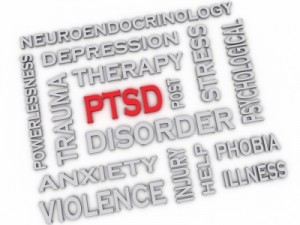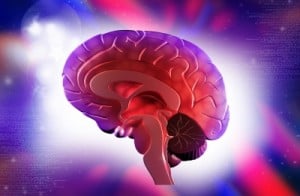
Post-Traumatic Stress Disorder, or PTSD, is a psychiatric disorder caused by experiencing a life threatening, terrifying, or traumatic event. Examples of events that may cause PTSD includes physical or sexual assault, catastrophic accidents, military combat experiences, unexpected deaths, and natural disasters. The person who develops PTSD either experienced the event first hand or witnessed another person experience harm. When a person is in danger, the brain naturally creates a “fight or flight” response in order to help protect people from potential harm. However, if a person has PTSD, their “fight or flight” response has been damaged, causing unnecessary feelings of stress and/or fright despite not being in danger. PTSD can occur at any age for both men and women, although women are more likely to develop the condition.
Some evidence suggests that whether or not a person is likely to develop PTSD may be related to genetics as well. PTSD is frequently accompanied by depression, anxiety disorders, and substance abuse issues. Although some of the symptoms of PTSD are not uncommonly seen after a traumatic event, PTSD is diagnosed if these symptoms worsen and continue for at least one month. PTSD symptoms in adults are understood in three categories, all of which must be experienced in order to be diagnosed
1. Re-experiencing symptoms – Because PTSD results from a traumatic experience, those suffering are reliving the fear on a day to day basis. Flashbacks, or reliving the traumatic experience, are a common occurrence and can even affect a person physically, including triggering symptoms like a racing heart and sweaty hands. These spontaneous, distressing memories are highly characteristic of PTSD. Fearful thoughts often occur on a regular basis, causing the person to be in a state of panic and fear. The re-experiencing can also manifest as bad dreams, ultimately causing sleep issues.
2. Avoidance symptoms – The fear that PTSD sufferers experience on a daily basis causes a person to try to avoid triggers in order to feel more comfortable. People suffering will often make an effort to steer clear of any reminders of the traumatic event, such as avoiding certain places or even objects that may remind them of the trauma. Such places or objects may trigger re-experiencing symptoms. Avoidance happens emotionally as well. The sufferer may become emotionally numb, having trouble remembering details about the inciting event. They may also experience strong feelings of depression, anxiety, and/or grief. Similar to depression, those suffering often lose interest in activities they once enjoyed and begin to isolate themselves, feeling disconnected from other people. Changes in their normal routine may occur, displaying the negative effects of PTSD on daily life.
3. Hyperarousal symptoms – Living with a tremendous amount of fear in day to day life causes the sufferer to experience symptoms of hyperarousal. Examples of this include having an exaggerated startle response, sensitivity to loud noises, constant feelings of tension even when it is unwarranted, feeling “on edge”, difficulty sleeping, and problems concentrating. Symptoms for children experiencing PTSD may be slightly different than adult symptoms, including sudden bedwetting, trouble speaking due to fear, and being unusually clingy to parents and authority figures. Teenagers typically experience symptoms similiar to adults, however they may feel extreme guilt over the traumatic event as well.
How Neurofeedback Can Help
 PTSD is a brain-based disorder affecting brainwave regulation. Therefore, neurofeedback can help ease the symptoms of PTSD by improving brain function after the trauma, thereby helping the sufferer eliminate flashbacks, hyperarousal, and feelings of depression. With the support of neurofeedback sessions, the sufferer work towards living life normally without fear, anxiety, and depression constantly looming over them. Call our office at 781-444-9115 to learn more about neurofeedback!
PTSD is a brain-based disorder affecting brainwave regulation. Therefore, neurofeedback can help ease the symptoms of PTSD by improving brain function after the trauma, thereby helping the sufferer eliminate flashbacks, hyperarousal, and feelings of depression. With the support of neurofeedback sessions, the sufferer work towards living life normally without fear, anxiety, and depression constantly looming over them. Call our office at 781-444-9115 to learn more about neurofeedback!

First image courtesy of David Castillo Dominici at FreeDigitalPhotos.net
Second image courtesy of stockimages at FreeDigitalPhotos.net

 PTSD is a brain-based disorder affecting brainwave regulation. Therefore, neurofeedback can help ease the symptoms of PTSD by improving brain function after the trauma, thereby helping the sufferer eliminate flashbacks, hyperarousal, and feelings of depression. With the support of neurofeedback sessions, the sufferer work towards living life normally without fear, anxiety, and depression constantly looming over them. Call our office at 781-444-9115 to learn more about neurofeedback!
PTSD is a brain-based disorder affecting brainwave regulation. Therefore, neurofeedback can help ease the symptoms of PTSD by improving brain function after the trauma, thereby helping the sufferer eliminate flashbacks, hyperarousal, and feelings of depression. With the support of neurofeedback sessions, the sufferer work towards living life normally without fear, anxiety, and depression constantly looming over them. Call our office at 781-444-9115 to learn more about neurofeedback!







